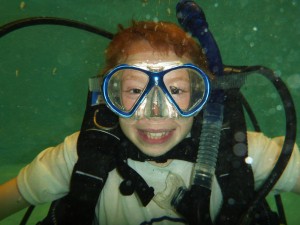Diving into a new adventure in a different world but still on earth. If you ever decide to be a scuba diver, it is very cool. The first part is mostly classroom work, not to mention the book and DVD’s you have to do at home. After that it is so fun. Once you breathe underwater for the first time you will feel the sensation. A diver will have to do two confined water dives and four saltwater dives to get his/her certificate. You will also have to set up most of your equipment. A diver’s equipment is heavy on land but in the water, it is as light as a feather. It is very cool to see coral and wildlife. If you decide to go scuba diving, there is a free trial that you don’t need a certificate to go to. If you decide to go scuba diving you will see I have left out a lot of details.
How many tanks can a diver have and how much air can they hold? There are actually many different kinds of the size of air you can hold. The 3 basic kinds are 80, 71.2, and 50 standard cubic feet (or SCF). Usually scuba divers have one tank but some scuba divers have two at the most. Some scuba divers have one big tank and one small tank called a pony tank. A pony tank is used as a backup air supply for if you run out of your tank air. This is how much air scuba tanks can hold and how many you can have.
We are now in the deep blue sea. A scuba diver can go down to 210 feet into the ocean. At 210 feet, a diver’s body would start pushing in on itself and squeeze him to death. How long you can go depends on depth, tank volume and the diver’s air consumption rate. At zero meters, or 1 bar/atmosphere, the air volume in a diver’s tank is 1. At 10 meters below the surface, the pressure is 2 bar/atmosphere. The air volume in a diver’s tank is one-half. At 50 meters, the pressure is 6 bar/atmosphere. The air volume is one-sixth. This means a diver only has one-sixth of the air in his tank available. These are some of the most important rules in diving.
What responsibilities does a diver have? The first rule in diving is always stay with a buddy. The second rule in diving is to control your buoyancy. The diver has a control over his left shoulder that has two buttons. One of the buttons gets air from the tank and then the diver has positive buoyancy. The other button lets go of air and the diver becomes negatively buoyant. Positively buoyant is floating at the surface in the water. Neutrally buoyant is floating, but inside the water. Negatively buoyant is sinking. The third most important rule is to never stop breathing. If you hold your breath while ascending, you could get lung over-expansion injury. Every scuba diver must know these rules.
If a person wants to be a scuba diver then they need to know the basics. You need to know how much air you have because if you run out of air underwater you know what that means. You need to know how deep you can go because if you go too deep you will squeeze to death. You need to know the responsibilities you have because if you don’t know you need air to go down then…I just don’t want to say it. There are lots of other things you need to know to go scuba diving. I have just given you the basics.


Bryson , sounds really interesting. There are many things you spoke about that I was not aware of. I did NOT like the part about your body being squeezed. Ugh. Anyway,it looks like you enjoyed your classes and now are ready for a real dive in the ocean. Maybe you can come down to Florida and get certified like Daddy did ??? Love Mema
So glad to have found your site. We’ve been living on the road for the past several years, first out of an RV and most recently out of a VW Bus. We’re a family of five (soon to be six) and life on the road is the only life for us. Except…since a stint in New England last summer when we began falling in love with boats.
Will be following along and hoping we can learn a little, and maybe make the transition from roadworthy to seaworthy in the next couple of years. I’d love for us all to live in the Mediterranean, hopping from country to island to continent…